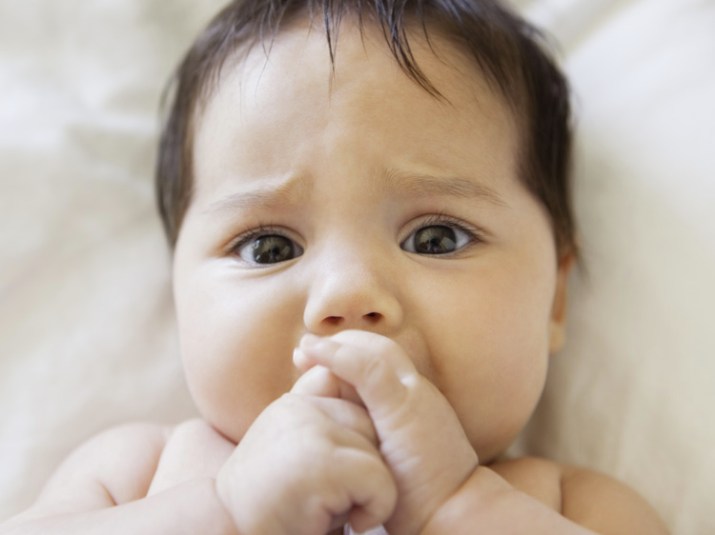Teething Gels With Benzocaine Aren’t Safe for Children, FDA Warns

If you have a teething baby on your hands, you’ve probably heard that remedies such as Orajel can help. But is Orajel safe? Turns out, Orajel and other teething products contain a potentially dangerous drug called benzocaine, which can cause rare but deadly side effects in children, according to the Food and Drug Administation (FDA). Now, the FDA wants these types of teething meds off the shelves entirely.
“We urge parents, caregivers, and retailers who sell them to heed our warnings and not use over-the-counter products containing benzocaine for teething pain,” said FDA commissioner Scott Gottlieb, MD, in a statement.
At least one major manufacturer, Church and Dwight Co. Inc., already said it would discontinue four Orajel teething brands, including Baby Orajel and Orajel Medicated Teething Swabs. Meanwhile, the FDA said it would take legal action against other companies that didn’t follow their instructions to remove these types of products from stores as soon as possible.
The agency has been warning about these products for more than a decade, but said that reports of illness and death have continued. And even if kids don’t react, there is little evidence that the meds even help them with teething pain in the first place.
One Mom’s Scary Experience With Orajel
Mom-of-two Danielle Kapetanovic knows the horror of accidentally putting her child’s health at risk with Orajel all too well. In February 2018, she publicly shared her experience on Facebook so no mother would have to go through what she did.
In hopes of easing her sweet 15-month-old baby’s sore gums, Kapetanovic explained decided to purchase an over-the-counter nighttime teething gel with a picture of a baby on the packaging. Little did she know that applying just a “pea-size” amount of the gel to her daughter’s gums would cause her daughter, Chloe, to stop breathing.
“Chloe immediately turned red, started kicking, got one or two screams in, and 10-15 seconds after the Orajel touched her gums she became unresponsive,” Kapetanovic wrote. “Her eyes locked in a dead stare, she became limp and stopped breathing. She turned blue.”
Kapetanovic said she began doing CPR on Chloe while her husband called 911.
“Thankfully, she woke up and started screaming and crying after maybe 15-20 seconds in total, which felt like an eternity,” Kapetanovic wrote. “The ambulance arrived and EMTs checked her out and determined she was okay.”
Although little Chloe was ultimately okay, her doctors still aren’t sure if what happened to her was a reaction to benzocaine — the active ingredient in Orajel — or a “breath-holding spell.” And as Kapetanovic later learned, the FDA was already advising against using Orajel on children under age two, despite the image of a baby on the packaging.
Why is benzocaine so dangerous?
Back in 2006, the Food and Drug Administration (FDA) released a warning about the potential dangers of products containing benzocaine — a local anesthetic used in Baby Orajel, Orajel, Orabase, Anbesol, and other topical pain relievers. The warning came after the agency received an upsetting number of benzocaine gel-related cases of methemoglobinemia — a rare but serious condition that reduces the amount of oxygen in the bloodstream — 15 of which occurred in children under two. The FDA released yet another warning in April 2011, urging parents to refrain from giving children under two products that contain benzocaine, unless under the advice and supervision of a health care professional.
According to the FDA, danger signs of methemoglobinemia include:
- pale, gray, or blue-colored lips, skin, and nail beds
- fatigue
- confusion
- shortness of breath
- headache
- rapid heart rate
“Symptoms can occur within minutes to hours after benzocaine use,” FDA pharmacist Mary Ghods, R.Ph., said in a statement. “They can occur after using the drug for the first time, as well as after several uses.”
If your baby is experiencing any of these symptoms after using benzocaine, Ghods recommends seeking medical attention immediately by calling 911. If left untreated, methemoglobinemia can lead to permanent injury to the brain and body tissues, and in serious cases, death.
More from FIRST
Mom’s Clever Hack for Getting a Baby to Take Its Medicine Goes Viral
Babies Born in September Are More Successful, Study Suggests













